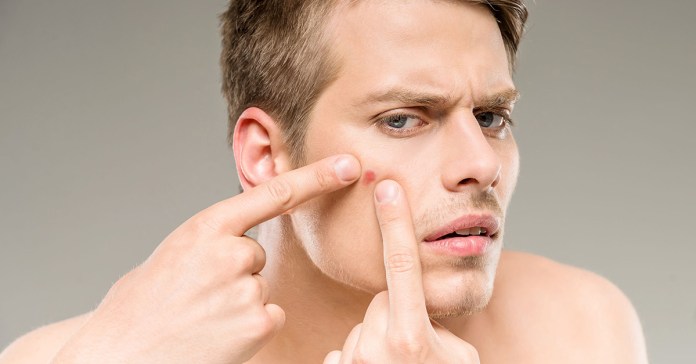When you’re an adult, acne is like a scary flashback to the teenage years. You already dealt with it once before! However, for women, the monthly hormonal changes of menstruation can be blamed. But what about grown men?
According to a study at the University of Alabama at Birmingham, about 42.5 percent of men ages 20 to 29 deal with breakouts. It also affects 20.1 percent of those between 30 to 39 years old, and 12 percent between 40 to 49 years old.1 Acne clearly isn’t just for the young ones.
Luckily, acne isn’t life-threatening or dangerous. It’s also one of the most common skin conditions out there. But that doesn’t mean it’s not embarrassing or frustrating–especially as an adult.
Ready to banish those breakouts? Learn about the causes of adult acne, and how to fix it.
How Do Pimples Form?

It starts with sebaceous glands underneath the skin. These glands produce oil, or sebum, to moisturize the skin. When oil mixes with bacteria and dead skin cells, a pimple grows.
Sometimes, sebaceous glands work a little too hard to make sebum. This is why people with oily skin tend to break out more.2
Causes Of Acne In Adult Men
1. You’re Not Sleeping Enough

You’ve probably heard that sleep is great for the brain and body. Well, do add skin to the list. If you don’t get enough shut-eye, pro-inflammatory cytokines act up.3 Oil production and breakouts will flourish.
Poor sleeping habits also increase stress, a condition that worsens acne.4 And the more you’re stressed, the less you will think about face washing and eating well. Make stress relief a priority, for the sake of your health.
2. You’re Skipping The Moisturizer

Moisturizer might seem like a bad idea, but can actually control excess oil. If your skin is too dry, glands will try to compensate by making more sebum. It’s the perfect scenario for zits.
Moisturizing promotes hydration. This stops the skin from churning out oil, so you’ll be less likely to break out. Keep this in mind if you use an acne-fighting face wash. The chemicals in these products are often harsh and drying, so be sure to moisturize afterward. Use something gentle with SPF.
3. Your Phone Is Gross

The cell phone is a dirty object. You touch it every day, all day. Think about how many germs are living on it!
Unsurprisingly, putting the phone up to your face gives bacteria a one-way ticket. Paired with extra oil and dirt, it’s the ideal recipe for pimples. Do your skin a favor and regularly disinfect your phone.5 Turn it off, let cool, then wipe it with an alcohol pad. When you’re on a call, use speaker mode or headphones.
4. You’re Eating The Wrong Carbs

Refined starches have a bad reputation. They’re linked to weight gain, type 2 diabetes, and all-around poor health. According to a 2016 study, these carbs cause another problem: Acne.
High-glycemic foods are in question. This includes foods like white bread, white rice, and potatoes.6 These carbs bring on hyperinsulinemia, which then increases levels of the hormone androgen. In turn, sebum production increases.7
It’s yet another reason to steer clear from refined carbs! Instead, reach for whole grain options like brown rice and quinoa.
5. You’re Eating Too Many Fried Foods

Many people think the grease from fried food causes oily skin. However, it’s not like the grease suddenly flows to your pores. The effect is actually driven by inflammation.
Fried food is full of saturated and trans fats.8 Both increase signaling of insulin-like growth factor 1 (IGF-1), the major growth hormone of puberty. It promotes the growth of cells in sebaceous glands and increases the inflammatory response in skin follicles. Together, these reactions bring on oily skin.9 Skip fried foods as much as possible. Opt for baking, poaching, roasting, or steaming instead.
Consider visiting a dermatologist. With a doctor’s help, you’ll have a better chance of handling adult acne.
References





